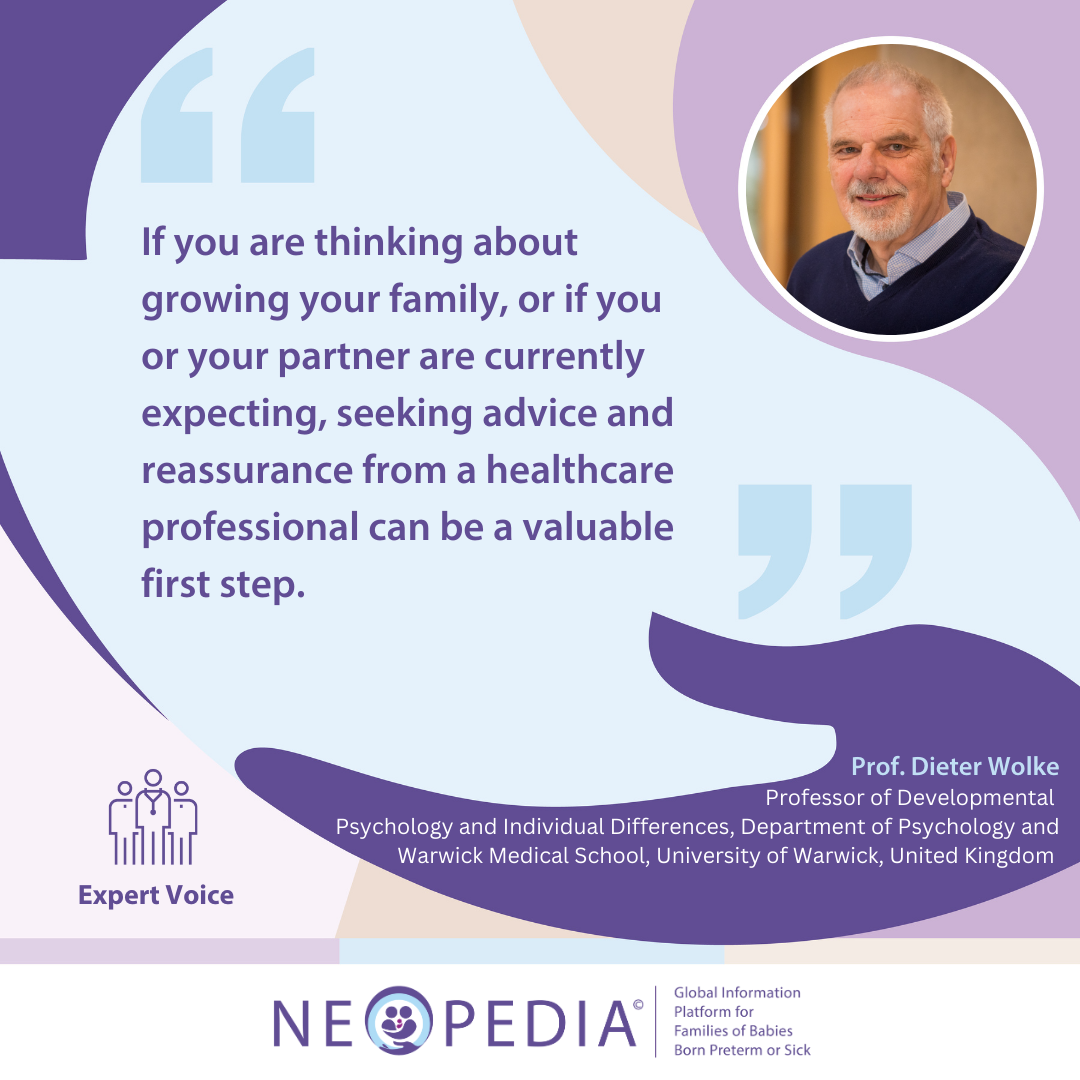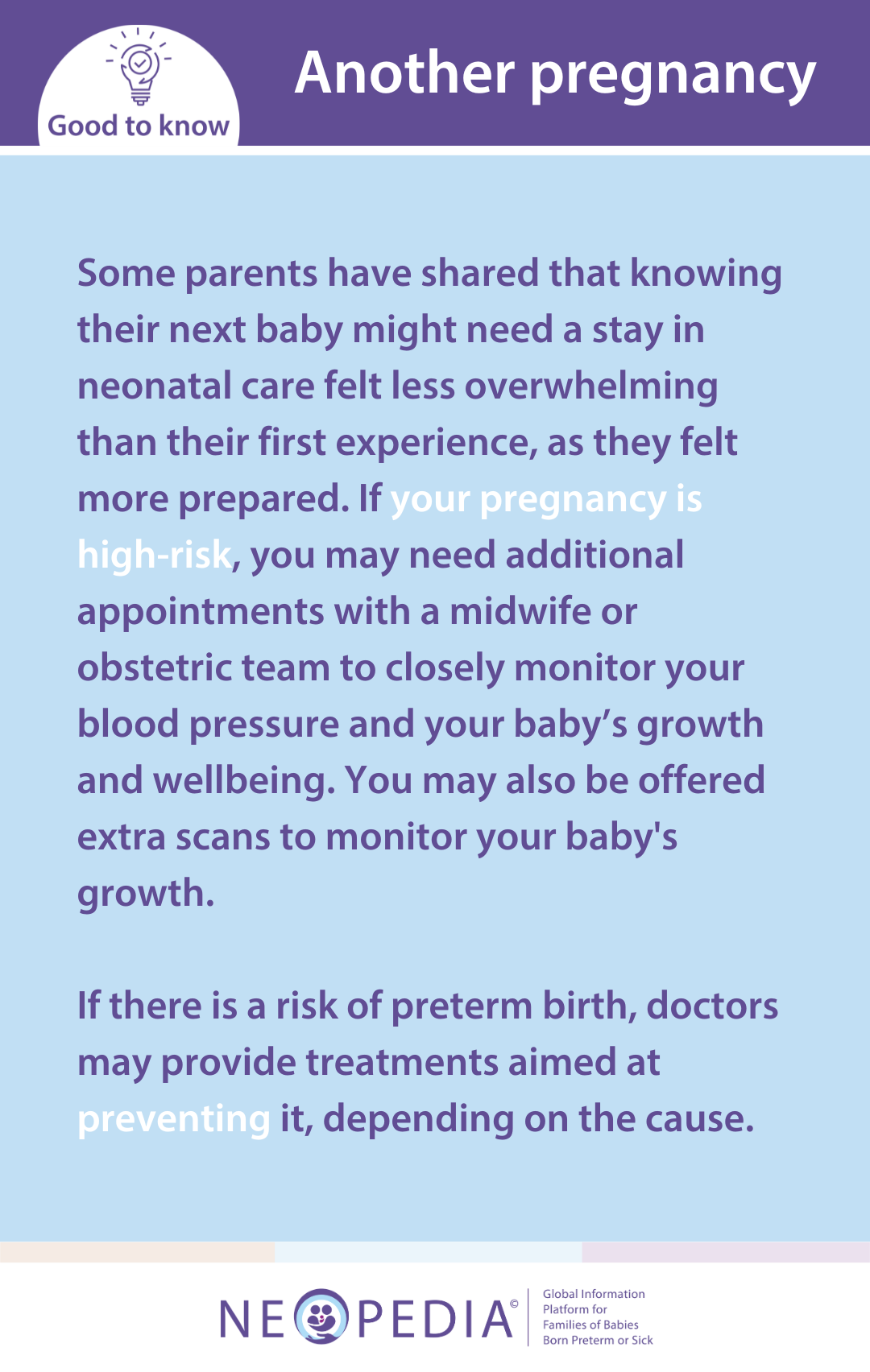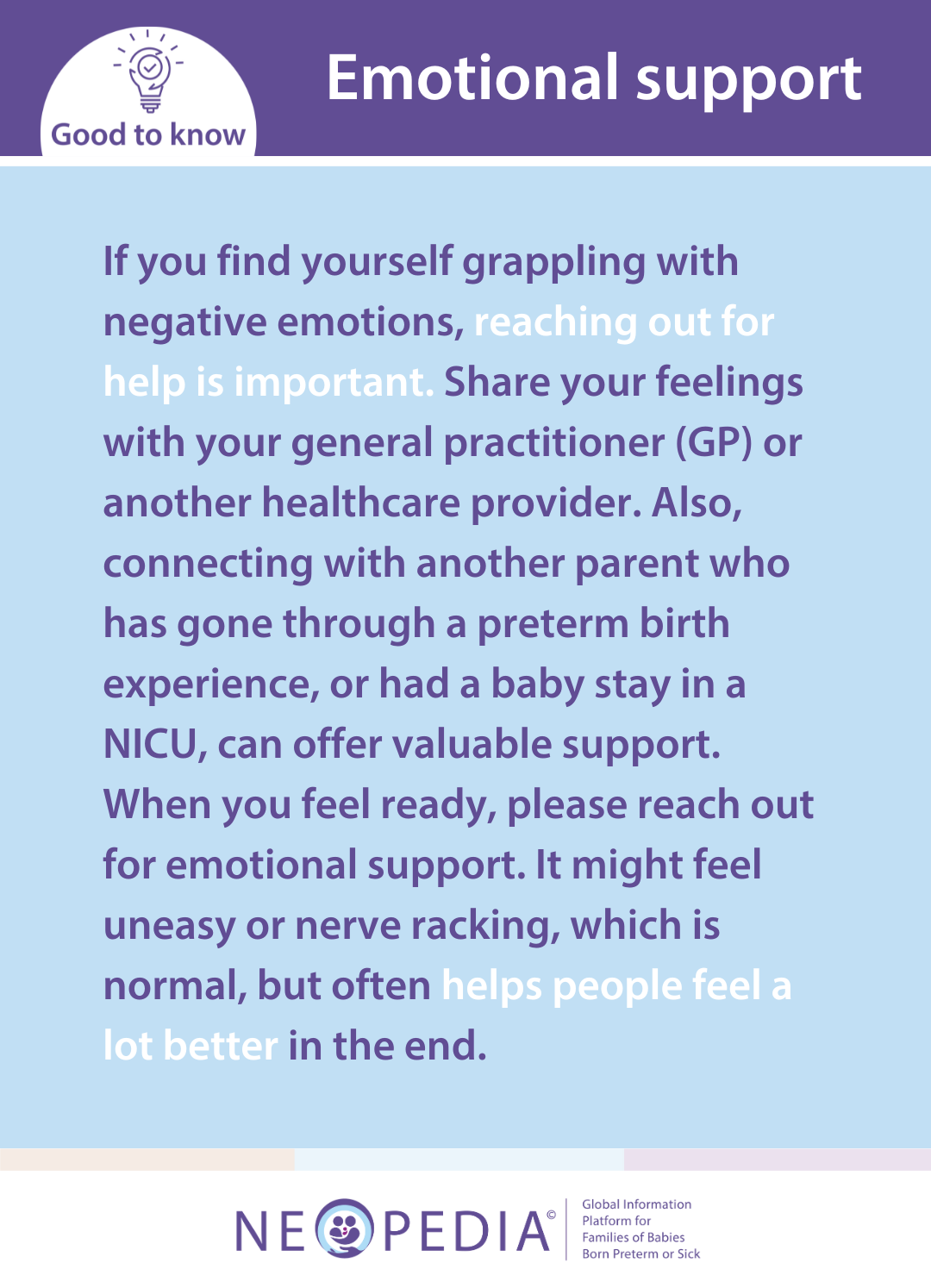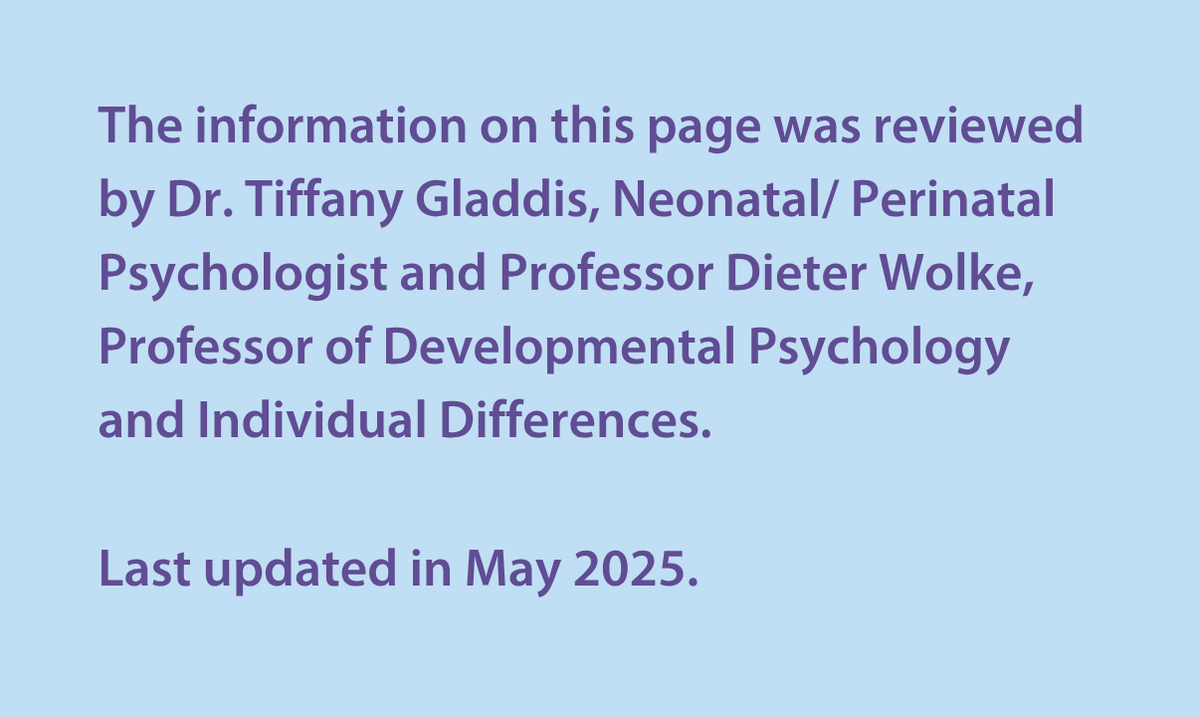
If you have previously had a baby in the NICU or have experienced the heartbreak of losing a child or children due to preterm birth or illness, you may find yourself wondering about the future and what it holds if you decide to have another baby. Reflecting on your past experiences with neonatal care is natural, and it is understandable to be concerned about the possibility of going through a similar situation again.
These feelings are common among many parents, and it is important to recognize that each pregnancy is unique.

To lower the risk of preterm birth, it is advisable to wait at least 18 months between becoming pregnant again. This period allows your body to recover fully from one pregnancy and prepare for the next. Using birth control, such as an intrauterine device (IUD)⍰ or an implant, can help prevent pregnancy during this recovery time. IUDs and implants are highly effective and require minimal maintenance, so once you have one, it works without any additional effort on your part. This is especially important to consider since if you have experienced a baby born early, there is up to a 1 in 4 risk of having another preterm birth.
If you are currently pregnant, talk to your healthcare provider about getting an IUD or implant right after your baby is born. If this is not done immediately after birth, you can discuss it during your postpartum check-up, which typically happens about six weeks after delivery.
Speaking to a consultant/ specialist
If you find yourself having questions and worries about becoming pregnant again after facing loss or a difficult pregnancy outcome, you can always ask your healthcare provider, can be a general practitioner (GP)⍰ or family doctor, to refer you to a consultant or specialist. The referral to a professional advisor is your opportunity to gather as much information as possible about your previous pregnancy and current health as it relates to your desire for a healthy pregnancy and baby. Preparing questions before your appointment can help you feel more prepared, and you might want to consider bringing someone with you to take notes so you can focus on the conversation.
Here are some questions you might want to ask:
Are there any treatments available to reduce the risk of having another baby born preterm or with health challenges?
What will happen if my next pregnancy is considered high-risk?
Some who have had a baby in the NICU, may face an increased risk of another high-risk pregnancy⍰. Conditions like a multiple pregnancy, pre-eclampsia⍰ and gestational diabetes⍰ can contribute to this risk. The healthcare professionals involved in your next pregnancy will depend on your medical history and the neonatal unit. At your first appointment, your healthcare provider may recommend that your pregnancy be consultant-, or specialist-led rather than midwife-led. This means a consultant, or a team of consultants will oversee your care, possibly alongside a midwife. It is also often recommended to book antenatal care at a perinatal center.
Your consultant team will be available to answer any questions you may have and help ensure that:

Experiencing a preterm birth and having your baby or babies stay in a NICU can deeply affect your emotional state and that of your partner or other family members during another pregnancy. Be gentle with yourself and each other. It is natural to feel worried and have an uneasy feeling about the progression of your pregnancy. This feeling will likely extend to those around you, including your other children, grandparents or other close friends and family members.
Parents who went through neonatal care often undergo shifts in their mental health. Some may grapple with heightened anxiety⍰, post-traumatic stress disorder (PTSD)⍰, or postnatal depression (PND)⍰. In a survey involving nearly 600 parents in the UK, 80% reported a deterioration in their mental well-being following their time in the neonatal unit.
Counselling could be beneficial for you and/or your partner. Research shows that mental health concerns often decrease as a result of therapy. It is often helpful to have a non-bias, third party to help process your experience, navigate your new normal, and assist with managing any tension or conflict that may arise between you and your partner as a result of the stress you are experiencing. It is normal for parents to respond differently to trauma and need different things during this time of stress.
If you have experienced the loss of a baby or the loss of multiples, considering the idea of trying for another child might take some time for you and your partner. Many may choose not to pursue another pregnancy at all. It is important to recognize that there is no right or wrong choice, and you should only consider what feels most appropriate for you.
The loss of multiples
Losing your babies is a devastating experience that few can truly understand. Due to the increased medical risks associated with multiples, many parents face the heartbreaking loss of one or more of their babies due to various factors. These losses can occur at the same time or at different times depending on the cause. Grasping the devastation of losing multiple children over the span of hours, days, weeks, or months is heartbreaking.
Even if the multiples were an unplanned addition to the family, many parents desire another pregnancy and often expand their families as soon as they are emotionally and physically ready. For those who underwent fertility treatment, there is often a fear of conceiving multiples again or facing challenges with conception. Welcoming a new baby after a pregnancy filled with anxiety can be a joyful experience that brings a sense of balance to parenthood.
Moving forward with a hopeful outlook
While science has not yet discovered a way to prevent babies being born too soon or with special healthcare needs, extensive research has focused on finding and reducing the risks of preterm birth and medical complications of babies.
Recent advancements have enhanced doctors' ability to identify women at risk for preterm delivery. Cervical ultrasound⍰ has proven highly effective in detecting early signs of preterm labor⍰, with its application possible as early as 16 weeks into pregnancy. Additionally, studies analyzing the mother’s blood and vaginal fluids offer further insight into predicting the risk more accurately.
Progesterone⍰ pills inserted in the vagina administered nightly from 16-37 weeks of gestation⍰ can aid in preventing preterm birth, particularly in mothers with a history of preterm delivery. This treatment is strongly recommended for women with a previous preterm birth and/or a short cervix⍰ identified through ultrasound. Also, cerclage, a procedure involving a stitch in the cervix, has long been employed to prevent preterm birth in women with a history of preterm delivery.
For pre-eclampsia⍰ prevention, there is increasing evidence supporting a risk-based approach to determine if low-dose aspirin⍰ (100-150 mg) should be offered during pregnancy. Please always contact your healthcare provider and do not take aspirin without consulting them first. Obstetricians, Maternal-Fetal-Medicine specialists and other healthcare professionals taking care for pregnant women can use effective screening to see if there is an increased risk or not. Please ask your healthcare professional about this screening. You can find more information in the guidelines to combat pre-eclampsia by the International Federation of Gynecology and Obstetrics (FIGO).
If your doctor prescribes aspirin, it is because the benefits outweigh the possible minimal discomforts.
Your healthcare team stands ready to offer treatment, guidance, and support for any ongoing concerns related to future pregnancies.
Knowing the risks of preterm birth and the ways to prevent it can help reduce some of the worries about deciding to get pregnant again.

